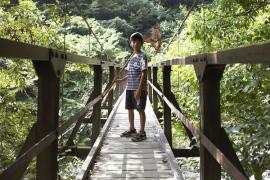Last November I had the pleasure of sharing a long car ride with Dr. Michael Thompson, during which he gave me a fun idea. We were on the way to Houston for a presentation he was giving about the benefits of summer camp, and I was picking his brain about writing while trying to hold my own in a game of swapping stories about camp.
I found the game difficult when matched with someone who has visited hundreds of camps and written books on why kids should attend camp. Nevertheless, he graciously listened to my story of growing up at Camp Champions, the same camp for which I had become the boys' director just two months before.
"You know what you should do," he remarked when the conversation came to a break. "You ought to write a short bit for Camping Magazine about everything you learned after your first summer as a camp director. You're new enough that you'll notice things the rest of us have forgotten, and you may start conversations with other young camp directors. And Steve can write a mirror piece on how to have a great summer with a first-year director. It'll be a hit!"
Nobody who works at camp will be surprised that I learned a TON during my first summer. However, I hope some seasoned vets will find it fun to return to those terrifying, exhilarating, confounding, and at times, embarrassing moments during their first summers — and maybe even remember something that they had forgotten.
So, with many thanks to a wise friend, these are the four most important things that I learned in my first year as a summer camp director.
1. "The Emotional State of an Organization is a Function of the Emotional State of its Leadership."
That fun mouthful, bestowed by Steve Baskin at the beginning of the summer and many times throughout, became an absolute mantra for me that first summer. Everyone knows that camp can be one big, twisty, emotional roller coaster. Everything fun is larger than life, and everything that goes wrong is blown out of proportion. Everyone is prone to get exhausted and cranky. The highs and the lows can take a toll throughout the summer.
This testy balancing act was steadied for me all summer by the repeated mantra: "The emotional state of an organization is a function of the emotional state of its leadership." Regardless of what happened, our leadership team could walk out of our morning meeting with smiles on and welcome a day of fun and adventure — and the campers and counselors would follow suit. If we decided to be happy, everyone else could figure out how to be happy too.
If we decided to hit the emotional reset button after a bleary day pent up in cabins by thunderstorms, everyone else could too. This refrain allowed us to minimize the energetic lows while riding the highs, and perhaps most importantly, help our staff stay on an even keel from which they maintained strong judgment and a tireless work ethic all summer long.
2. Every Hour Spent Vetting a Top-Notch Staff Is an Hour that Pays Back Tenfold Once the Summer Arrives.
Somehow, with much help from the vastly more experienced people around me, I stumbled into an extremely strong counselor staff my first summer. I have a hard time imagining being prouder of them. But even so, just as we had all-star counselors who took to camp like ducks to water, we had some who took longer to get the hang of it — and even a couple who had shortened stays.
Asking someone to leave early is never an easy decision and can have ramifications with the entire staff. All of that takes lots of time and energy away from the fun we would rather be having at camp. In the same way, camper issues that arise because a counselor isn't as vigilant or prepared or engaged as he or she could be take time and effort that could have potentially been avoided with a little more preparation in the offseason.
In short, I was convinced beyond a shadow of a doubt that every hour put into vetting a great staff in the spring comes back in spades during the summer. In fact, this is really just one of the better examples of the overall pattern that time invested during the offseason tends to show a great return and reduce the need to fix issues later once the summer has begun. Hopefully that's a source of motivation that stays strong throughout the winter and spring.
3. Being Right All the Time Isn't Worth the Trouble.
It is hard to underestimate the importance of feelings at camp. A delicate emotional balance tends to develop when a staff is working hard all summer: Strong morale is critical, but emotions can turn quickly. This leaves a first-time director in the tricky position of figuring out how to manage emotional swings while also requesting a high level of performance.
One of the best strategies that I learned to maintain a happy and high-performing staff was simply to let other people be right (especially when the stakes were low). I was tempted numerous times to make an executive decision or to overrule a staff member, but the emotional toll on the staff member was rarely worth it.
With the obvious exception of safety situations, protecting morale and community is almost always more important than being right about how to handle a small issue. It's fun to be out front or take the lead in an activity and connect with kids, but the best way to make sure that all campers are adequately attended to is to set up every counselor for success. Overruling on a single camper interaction or taking over a part of an activity may cause the overruled counselor to second-guess himself or herself in the future.
It's not the director's job to be the best counselor at camp. It is our job to set the staff up for success, communicate well, and add a little something special to each day. My first summer taught me that trying to be right about every little thing just isn't worth the trouble; it is when we set people free to do the work that they've been trained to do that they are most likely to make our expectations look paltry in comparison to what they accomplish.
4. Giving Exceptions Is Like Trying to Fight a Hydra.
Do you remember the story of the mythical Hydra, the many-headed beast that, when one head is cut off, grows two more in its place?
I was reminded of the Hydra often during my first summer. In my attempt to maintain a motivated and happy staff, I was often tempted to award small exceptions to rules when the consequences of doing so seemed minimal.
Was it okay for a counselor to show up for orientation a day late so he could spend a birthday with his sister? "Not a problem."
Could a counselor switch his day off to spend it with a new group of friends, even though it would leave his activity department one short for the day? "Go ahead, we'll work around it."
Could an instructor teach just one sail activity each day even though he worked in a different department? "Well sure, if that will make you happier."
This flexibility with requests certainly does pay short-term dividends by making a staff member feel taken care of. But you can be sure that by the next day, two more similar requests will be made, and then four more will arrive after that. Soon an overly flexible director has created a beast with many heads, and everybody feels that his or her exception should be granted.
So is the answer to be an iron-fisted guardian of the rules? Maybe. But having no flexibility can also lead to poor staff morale. I found it most effective to be an iron-fisted guardian of the camp's mission rather than just the rules.
As I'm sure is true of most camps, one of our primary objectives during orientation is to get our counselors to buy into our mission-oriented camp culture. Everything is supposed to come back to creating a community where campers are challenged to grow by trying new things.
By the end of the summer, I learned to evaluate every exception that was requested in the context of this mission, knowing that similar exception requests would follow if the first was granted. This led mostly to "no's", but the counselors got it. When the effects on mission were discussed, they understood and often agreed. The final step was to help think of an alternative, but even when there wasn't one, the counselors felt heard and appreciated rather than simply turned down.
I also enjoyed having to fight a lot fewer hydras.
Finally, I relearned one more lesson as much during my first summer as a director as any other summer I have spent at camp. One of our other longtime directors likes to tell the story of Eric Greitens, a Rhodes Scholar and Navy SEAL who served four tours of active duty. Greitens is a model of service to something greater than himself and has been quoted as saying, "Your vocation is where your love and passion overlap with the world's needs."
To find a career full of people with more passion and love for what they do than camp professionals would be a chore, and I know that the world needs what camp offers to kids. It was a blast for me to experience this even more during my first year as a full-time camp director, and I look forward to continuing to learn and meeting more fantastic colleagues in the years to come!
Photo courtesy of Erec Hillis.
Author note: This article is based on the author's experiences during the summer of 2013.
Erec Hillis is the boys' camp director at Camp Champions. He graduated from UC-Berkeley in 2010 but always spent his college summers back at camp. He is now working full time and loves helping to create the magic of the camp experience that he had for others. He can be reached at [email protected].
Originally published in the 2014 September/October Camping Magazine.



